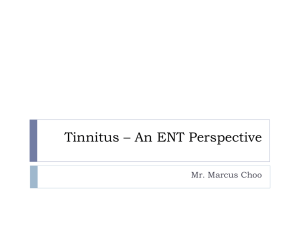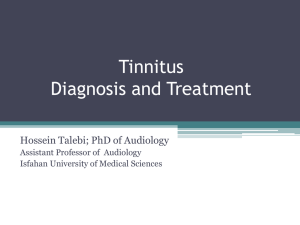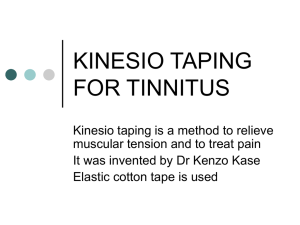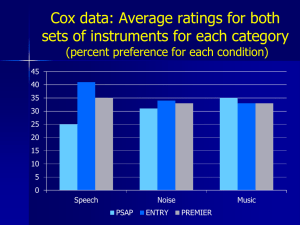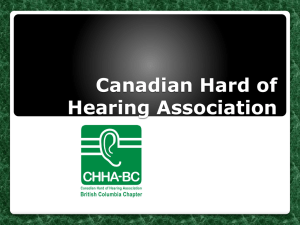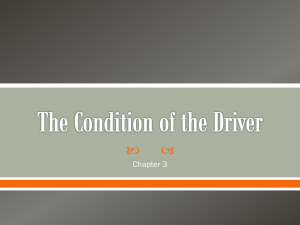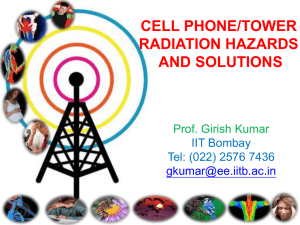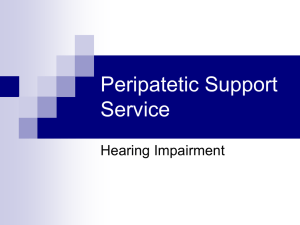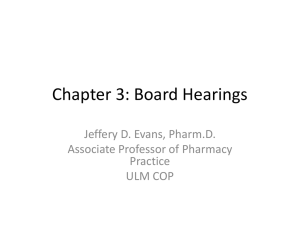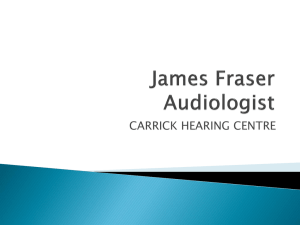Overview of tinnitus – including the role of hearing aids in
advertisement
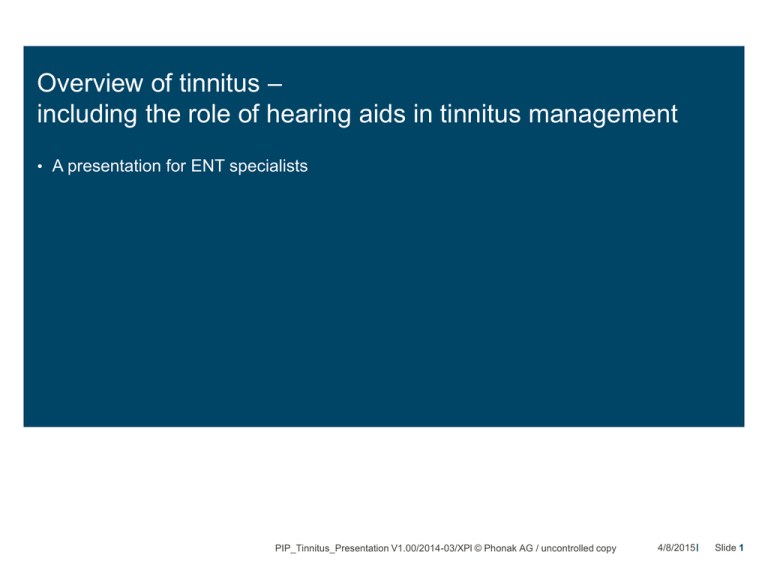
Overview of tinnitus – including the role of hearing aids in tinnitus management • A presentation for ENT specialists PIP_Tinnitus_Presentation V1.00/2014-03/XPl © Phonak AG / uncontrolled copy 4/8/2015 Slide 1 Objectives • To describe the key features of tinnitus • To show how tinnitus is a substantial health burden • To reveal the role of hearing loss in tinnitus • To present the options for management, including the central role of hearing aids 4/8/2015 Slide 2 What is tinnitus? • Perception of sound but no external source • Usually experienced as buzzing, hissing or ringing – Not fully-formed sounds e.g. speech or music – Not sound hallucinations experienced during bouts of mental illness – Occurs in one or both ears, or arising within the head • It can have a profound effect on the sufferer “… perceived severity of tinnitus correlates closer to psychological and general health factors, such as pain or insomnia, than to audiometrical parameters …” Langguth B, et al. (2013) Lancet Neurol.12:920-930; Zöger S et al. (2006) Psychosomatics. 47:282-288. (Zoger et al, 2006) 4/8/2015 Slide 3 Sound features of tinnitus Sounds experienced in tinnitus can vary according to several criteria: NOISE CRITERIA POSSIBLE FEATURES Onset Sudden, gradual Pattern Pulsatile, intermittent, constant, fluctuating Site Right or left ear, both ears, within head Loudness Wide range, varying over time Quality Pure tone, noise, polyphonic Pitch Very high, high, medium, low Langguth B, et al. (2013) Lancet Neurol.12:920-930. 4/8/2015 Slide 4 Evaluating tinnitus severity • Tinnitus is highly variable. Some patients are able to cope with the noise and their lives continue as normal. Langguth B, et al. (2013) Lancet Neurol.12:920-930. • At the other extreme, some patients suffer so much that daily living is difficult and they are unable to work. Others suffer a level of impairment between these two levels. 4/8/2015 Slide 5 The burden of tinnitus SCALE OF PROBLEM IMPACT TINNITUS RISK FACTORS A GROWING PROBLEM • Tinnitus affects • Tinnitus limits • Hearing • Increasing size 10%–15% of the general population worldwide • This is an estimated 280 million people daily living in 1%–2% of people with tinnitus impairment • Increasing age of the elderly population • Gender (male) • Frequency of • Exposure to noise Geocze L, et al. (2013) Braz J Otorhinolaryngol.79:106-111; Langguth B, et al. (2013) Lancet Neurol.12:920930; Roberts LE, et al. (2010) J Neurosci. 30:14972-14979. noise exposure in work and leisure environments 4/8/2015 Slide 6 Peripheral events lead to central neurological changes • A range of peripheral events can lead to central neuronal changes that manifest as tinnitus • Other factors can be involved in either the development or the persistence of tinnitus HEARING LOSS CENTRAL NOISE TRAUMA AUDITORY PATHWAY OTOTOXIC DRUGS TINNITUS ONSET TINNITUS PERSISTENCE NEURONAL ABNORMALITIES AUDITORY NERVE ABNORMALITIES Langguth B, et al. (2013) Lancet Neurol.12:920-930. 4/8/2015 Slide 7 Brain response to auditory deprivation • Patients with tinnitus exhibit enhanced auditory sensitivity DECREASED SOUND INPUT INCREASED SOUND SENSITIVITY • This is caused by hyperactivity of the auditory central nervous system – Homeostatic pathways cause increased central ‘gain’ (i.e. sensitivity) in response to auditory deprivation to: 1. Maintain 2. Ensure central nervous system activity during low sensory input nerve activity is modulated to respond to changes in sensory input • In patients with tinnitus and hearing loss, the tinnitus pitch and the hearing loss frequency spectrum are usually matched Hebert S, et al. (2013) J Neurosci 33:2356-2364; Langguth B, et al. (2013) Lancet Neurol.12:920-930; Norena AJ, Farley BJ. (2013) Hearing Res 295:161-171. 4/8/2015 Slide 8 Tinnitus is a balance of sensory input and spontaneous activity The decreased input from the cochlea, due to outer hair cell damage, results in readjustments in the central auditory system resulting in abnormal neural activity including hyperactivity, bursting discharges and increases in neural synchrony. AUDITORY DEPRIVATION AND CENTRAL GAIN ALTERED SPONTANEOUS NEURONAL ACTIVITY TINNITUS Norena AJ, Farley BJ. (2013) Hearing Res 295:161-171. Kaltenbach JA. (2011) „Tinnitus: models and mechanisms“. Hear Res. June; 276 (1-2) : 52 – 60. 4/8/2015 Slide 9 Tinnitus and hearing loss Most patients with tinnitus have some degree of hearing loss 75%–90% ABOUT 80% OF PATIENTS WITH OTOSCLEROSIS HAVE TINNITUS OF PATIENTS WITH IDIOPATHIC SENSORINEURAL HEARING LOSS HAVE TINNITUS “Hearing loss is a hidden disability and to have tinnitus is sort of like a double whammy” Family physician with moderate tinnitus, Canada Axelsson A, Ringdahl A (1989) Br J Audiol 23:53-62; Ayache D, et al (2003) Otol Neurotol 24:48-51; NosratiZarenoe R et al (2007) Acta Otolaryngol 127:1168-1175; Sobrinho PG et al. (2004) Int Tinnitus J 10:197-201; Schaette R et al. (2012) PLoS One 10.1371/journal. pone.0035238. 4/8/2015 Slide 10 Tinnitus and distress: a vicious cycle • Experiencing sound in the absence of an external stimulus can be emotionally upsetting • This reaction can make the sounds appear worse • This results in a vicious cycle of worsening tinnitus and increasing distress TINNITUS EMOTIONAL DISTRESS Schaette R. (2012) Phonak Focus 42. 4/8/2015 Slide 11 Other psychological associations with tinnitus • Tinnitus is associated with increased levels of psychological problems – 24/90 (26.7%) versus 5/90 (5.6%) for age-matched controls without tinnitus HYPOCHONDRIA HYPERACUSIS ANXIETY TINNITUS COGNITIVE IMPAIRMENT Andersson G, McKenna L. (2006) Acta Otolaryngol Suppl. 556:39-43; Belli H, et al. (2012) Gen Hosp Psychiatry. 34:282-9; Jackson J, et al. (2013) Int J Audiol. E-pub ahead of print; Langguth B, et al. (2013) Lancet Neurol.12:920-930. DEPRESSION SLEEP PROBLEMS 4/8/2015 Slide 12 Anxiety and depression correlate with severity of tinnitus TINNITUS (ALL SEVERITIES), N=80 HIGH-RISK OF CHRONIC, DISABLING TINNITUS, N=144 r P r P Current minor depression (SCID) 0.42 <0.0001 0.43 <0.0001 Major depression (SCID) 0.41 0.0002 0.39 <0.0001 Current anxiety disorder (SCID) 0.12 NS 0.28 0.0010 0.01 NS 0.26 0.0023 0.42 <0.0001 0.48 <0.0001 Depression (HADS) 0.30 0.0079 0.38 <0.0001 Anxiety (HADS) 0.35 0.0018 0.45 <0.0001 Total (HADS) 0.36 0.0014 0.46 <0.0001 Current multiple anxiety disorders (SCID) Current depression and/or anxiety disorders (SCID) r = correlation coefficient between severity of tinnitus and prevalence of depression and anxiety (higher r = stronger correlation) HADS: Hospital Anxiety and Depression Scale; NS: non statistically significant; SCID: Structured Clinical Interview for DSM-III-R Zöger S et al. (2006) Psychosomatics. 47:282-288. 4/8/2015 Slide 13 Other tinnitus-associated problems SLEEP PROBLEMS COGNITIVE IMPAIRMENT HYPERACUSIS • Sleep disturbance is • Patients with tinnitus can • Hyperacusis is an common in patients with tinnitus • In particular, the time taken to achieve sleep may be lengthened in tinnitus patients • Insomnia and tinnitus- associated distress can work together in a worsening spiral to adversely affect psychological wellbeing exhibit depressive functioning and/or anxious vigilance • Cognitive performance can be worse among tinnitus sufferers versus controls in the absence of depression and anxiety oversensitivity to certain sound frequencies or volumes • It is common among tinnitus sufferers and may be a consequence of tinnitus • In an age-matched control study, 60% of tinnitus sufferers reported hyperacusis, compared to 20% of controls • Hyperacusis is measureable in tinnitus ears with and without hearing loss Andersson G, McKenna L. (2006) Acta Otolaryngol Suppl. 556:39-43; Bastos de Magalhaes SL, et al. (2003) Int Tinnitus J. 9:79-83; Belli H, et al. (2012) Gen Hosp Psychiatry. 34:282-9; Hebert S, et al. (2013) J Neurosci. 33:2356-2364; Jackson J, et al. (2013) Int J Audiol. E-pub ahead of print; Langguth B, et al. (2013) Lancet Neurol.12:920-930; Wallhäusser-Franke E, et al. Sleep Med Rev. 17:65-74. 4/8/2015 Slide 14 Tinnitus management options Currently, there is no cure for tinnitus, but management is possible EVIDENCE BASED TINNITUS MANAGEMENT APPROACHES e.g. TINNITUS RETRAINING THERAPY HEARING AIDS DRUGS TINNITUS COUNSELLING SOUND THERAPY Belli H, et al. (2012) Gen Hosp Psychiatry. 34:282-9; Langguth B, et al. (2013) Lancet Neurol.12:920-930; Shekhawat GS, et al. (2013) J Am Acad Audiol. 24:747-762 COGNITIVE BEHAVIOURAL THERAPY 4/8/2015 Slide 15 Hearing aids are central to tinnitus management • Reports of the use of hearing aids in the management of tinnitus go back over 60 years • Because hearing loss is often associated with tinnitus, at least partial restoration of hearing should help to reduce the central gain in auditory perception that is a feature of tinnitus • A recent scoping review of studies of hearing aids in tinnitus revealed that 17/18 publications showed improvements in tinnitus symptoms by fitting hearing aids “The majority of studies reviewed support the use of hearing aids for tinnitus management. Clinicians should feel reassured that some evidence shows support for the use of hearing aids for treating tinnitus …” Shekhawat et al, 2013 Shekhawat GS, et al. (2013) J Am Acad Audiol. 24:747-762 4/8/2015 Slide 16 Interventional studies of the benefits of hearing aids • A scoping review identified 11 interventional studies of hearing aids • Six types of tinnitus evaluation were used: – THI x 4; THQ x 1; TRQ x 1; TSI x 1; TQ x 1; VAS x 3 • Up to 50% reduction in tinnitus severity • 10/11 studies showed improvements >10% Tinnitus measurement tool THI: Tinnitus Handicap Inventory; THQ: Tinnitus Handicap Questionnaire; TRQ: Tinnitus Reaction Questionnaire; TSI: Tinnitus Severity Index; TQ: Tinnitus Questionnaire; VAS visual analogue scale (various) Shekhawat GS, et al. (2013) J Am Acad Audiol. 24:747-762 4/8/2015 Slide 17 Patient and hearing-care professional surveys of the benefits of hearing aids Scoping review identified 4 survey studies STUDY 1 STUDY 2 STUDY 3 STUDY 4 • Binaural hearing • 65.5% of • Fitting a hearing • Audiologist- aids provided benefit in 66% (47/71) of tinnitus patients patients with frequent tinnitus reported improvements with hearing aids • 41.4% reported disappearance of symptoms Shekhawat GS, et al. (2013).J Am Acad Audiol. 24:747-762 aid was the most frequently reported benefit of visiting a specialised tinnitus clinic • Reported by 34.9% of patients reported tinnitus relief after fitting a hearing aid – Minor to major relief in 60% of cases – Major relief in 22% of cases 4/8/2015 Slide 18 Masking level and tinnitus reduction • Retrospective study of 70 patients with tinnitus in Australia • Tinnitus severity measured using the tinnitus reaction questionnaire (TRQ) • Overall, 51% of patients experienced “clinically significant” change (≥40% change in TRQ score) McNeill C, et al. (2012) Int J Audiol. 51:914-919. 4/8/2015 Slide 19 Psychological and behavioural support INTERVENTION DESCRIPTION Counselling and education • • Delivered in person, to groups and via the internet Variable results may depend on personal characteristics • Designed to modify maladaptive behavioural and emotional responses One-to-one and group settings, delivered by psychologists or psychiatrists, or via internet Statistically significant reductions in severity of tinnitus symptoms (P<0.05) Cognitive behavioural therapy • Relaxation therapy • • May help reduce tinnitus symptoms and depressive symptoms Hoare DJ, et al. (2011) Laryngoscope 121:1555-1564; Langguth B, et al. (2013). Lancet Neurol.12:920-930 4/8/2015 Slide 20 Drug options for tinnitus management DRUG CLASS EXAMPLES OF DRUGS USED IN TINNITUS Antidepressants tricyclics, selective serotonin reuptake inhibitors Antipsychotics sulpiride Mood stabilisers gabapentin, valproate Sedatives/hypnotic benzodiazepines s • No approved drugs (European Medicines Agency [EMA] or US Food and Drug Administration [FDA]) • Some psychopharmacological agents may help reduce the severity of psychological issues associated with tinnitus, and some may also lessen tinnitus symptoms Belli H, et al. (2012) Gen Hosp Psychiatry. 34:282-9; Langguth B, et al. (2013) Lancet Neurol.12:920-930 4/8/2015 Slide 21 The need for multidisciplinary care • Tinnitus management should include hearing aids with appropriate frequency ranges together with psychological support and education • This requires a multidisciplinary care team – GP, ENT specialist, psychologist/psychiatrist and hearing-care professional • As a leading supplier of hearing aids, Phonak can be another member of your team, helping your patient to have the optimal hearing aid for their situation 4/8/2015 Slide 22 Thank you. Contact information Phone: Email: Website: 4/8/2015 Slide 23

